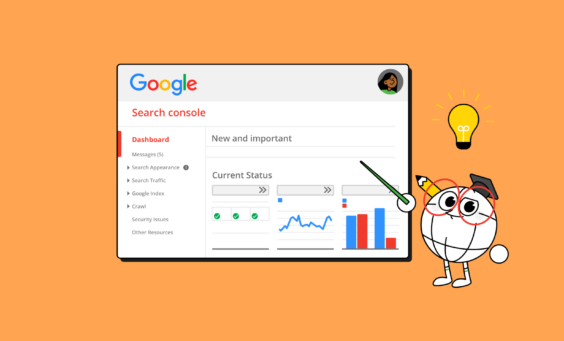Real estate is fundamentally local, which is why developing a strong grasp of local SEO is so imperative.
This guide offers tailored strategies for professionals who want to perform SEO for real estate companies. It focuses on optimizing listings, enhancing online presence, and driving targeted traffic to your client’s real estate business.
What even is local SEO anyway?
Local SEO for real estate is aimed at boosting your company’s visibility on search engines like Google, specifically for potential buyers and sellers in your area.
This strategy increases your company’s search engine rankings, enhancing your online discoverability to local traffic. In the competitive real estate market, where establishing local connections is crucial, effective local SEO tactics are essential for standing out.
While we’ll mainly focus on Google due to its widespread use, the concepts behind local SEO for real estate ensure your services are found by the right local audience, regardless of their starting point in the search process.
As you can see below, there are more than a few different ways people are using search to find something specific. Local SEO is your opportunity to rank for each and every one of these different variations and get yourself in front of the right people, whether they want a luxury condo in Miami or a two-bedroom house in Scranton.

Gone are the days of relying solely on billboard ads, newspaper ads, and cold calls.
As a marketing professional, you’re tasked with ensuring property seekers find your client’s offerings before those of your competitors. Tailoring your SEO tactics to the real estate market demands a comprehensive grasp of local consumer behavior and search trends.
You’ll first want to initiate this process by analyzing local search queries related to real estate in the area where your client is located. These can be queries like the ones shown above or maybe broader, with people just looking for realtors themselves.

The next part of the puzzle is the optimization of an online presence across various platforms, ensuring high visibility. Ultimately, the goal is to position your client’s real estate business as the top choice for local searches in their area.
More on that below.
Why focus on local SEO for real estate when there are so many other marketing things to do?
High visibility in local search results directly correlates with increased property inquiries, so much so that the National Association of Realtors reported that a staggering 97% of homeowners used the internet in the search for a new home.
Having a robust online presence today is simply a necessity.
It’s about making your real estate business the go-to source in your community, leveraging targeted keywords, and optimizing your online presence to meet the specific needs and interests of the local market.
In doing so, you’re not just improving your search rankings; you’re building trust and establishing a strong local brand that resonates with potential clients right in your backyard.
Why do real estate companies need to look at local and not just do traditional SEO?
What’s different for local compared to traditional search is that it’s not just a focus on a website. An e-commerce company likely just wants to rank its website, but a real estate company or an individual real estate agent is likely going to be competing for spots in the local pack.
The Local Pack is the section at the top of a search that Google deems as local. It lists several businesses and places them on a map. It lists these businesses using its Google Business Profile (GBP), and technically you can rank one of these without even having a website.
This means that real estate companies need to focus on optimizing for the local pack and the local organic results.
Real Estate SEO Basics
The fundamentals of real estate SEO can be complex and overwhelming, but they don’t need to.
Here’s where I would begin:
Perform an Audit
While local searches don’t necessarily need a website to rank, there’s a good chance that a professional realtor is going to use a website as the core of their marketing.
Understanding your website’s current performance is crucial before planning any SEO enhancements. An SEO audit reveals high-performing pages and areas needing refinement, offering a clear snapshot of your digital footprint. While audits require effort, they provide a critical baseline to measure future progress and develop an effective strategy for growth.
These tasks aren’t specific to real estate. They’re about making sure your website offers the best experience possible.
Consider the following key aspects during your audit to identify improvement opportunities:
- Site Structure: Evaluate your XML sitemap, robots.txt files, and any redirect issues.
- Page Elements: Review titles, meta descriptions, headings, alt tags, and URL structures.
- Content Quality: Assess content organization, keyword usage, link integration, and visual content, and check for duplications or canonical issues.
- Link Health: Analyze both inbound and outbound links, the quality of internal linking, and identify any broken links.
- User Experience: Ensure the site is accessible, mobile-friendly, and fast-loading.
Enhancements in these areas can lead to significant gains in organic traffic. Utilize tools like Google Analytics and Google Search Console to pinpoint pages requiring attention and identify fixable issues. These platforms also offer valuable resources like PageSpeed Insights.
The best part? These tools are free, and you can glean a tremendous amount of data to work with.
Don’t get too caught up in competing audit software and tools. There’s a time and a place for them, but the tools mentioned above will get you where you need to go.
Free Video Course - Google Analytics 4: Essentials for Local SEO
Embark on a journey to unravel the mysteries of Google Analytics 4, with expert trainer Dana DiTomaso as your guide. Dive into the essentials, demystify complex analytics concepts, and learn to harness GA4's power for local success.
Conduct In-depth Keyword Research
Effective keyword research forms the backbone of any successful local SEO campaign in the real estate domain.
Focus on identifying long-tail keywords that potential buyers or renters frequently use in their searches. Analyze search volume and competition levels to prioritize the keywords most likely to bring results.
Sure, ranking for the term ‘realtor’ sounds like a great idea on paper. But there’s a good chance that’ll be incredibly difficult to achieve. You’ll be playing against big sites like realtor.com and a few others. This is where those long-tail keywords can come into play.
Tip! Understanding the local lingo and incorporating it into your keyword strategy can set your client apart.
For example, consider including nicknames for the neighborhoods or local events/activities. A lot of this information can be found through your client directly, or on platforms like Reddit.
Tools like Google Keyword Planner can be a free and a powerful place to start.

In any form of SEO, understanding search intent is key. It typically falls into four categories:
- Informational: Very common in real estate. Whether someone is looking for advice on getting a mortgage, understanding home inspection processes, or exploring neighborhood guides, they’re seeking information. These terms are more likely to display traditional organic search engine results pages (SERPs) or localized versions of those.
- Navigational: This occurs when a prospective buyer or seller knows which real estate agency or property listing site they want to visit but uses Google to get there quickly. These are likely to be branded in some way. They could be people searching for a specific type of property on a real estate aggregation site or for a property with a realtor they’ve already heard of.
- Transactional: The moment a buyer decides they’re ready to contact an agent, schedule a viewing, or even make an offer online. They’ve moved beyond browsing to taking concrete steps toward a purchase.
- Commercial Investigation: Potential clients in this stage are almost ready to make a decision but are comparing different properties, agents, or mortgage options. They’re seeking the best fit for their needs before committing. This could be terms like ‘two-bed apartments in [location]’. With a conversion journey as long as house buying, this may not be as immediately transactional as some types of business where people are searching for a specific product.
Catering content to match these intents can significantly boost a real estate website’s effectiveness in attracting and converting potential clients.
By identifying key phrases, such as “real estate in [location]” or “homes for sale in [location],” professionals can tailor their online content to match these specific searches. The use of modifiers and variations on these keywords allows for a broader reach, capturing a wider audience with slightly different search habits.
Some other searches, without a modifier, may still be localized by Google. For instance, an informational search of ‘Do I need a survey to get a mortgage’ performed in Dallas, Texas, provides answers from a number of local real estate sites.
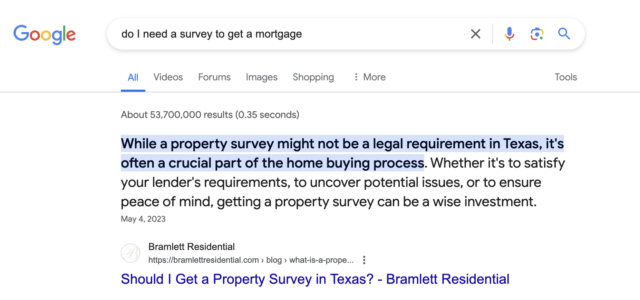
This strategic approach ensures that your client’s listings and content resonate directly with the search intent of buyers and sellers, significantly enhancing visibility and engagement.
When doing your keyword research, also try tools like Google Trends to get a feel for how the local real estate market is doing.
Competitive Analysis
Understanding the competition is key to standing out in the real estate market. With a thorough analysis of other real estate websites and their SEO strategies, you can uncover ways to set your client’s listings apart and carve out a unique position in the market.
Seeing a competitor’s listing at the top for a specific keyword is a signal that they’re doing something effectively. Google’s preference for that realtor’s content over others is a clear indication of what works.
It’s your task to decipher the successful elements of that top-ranking content, replicate those strategies, and then go a step further to outshine the competition. Performing a Google Business Profile Audit can give you a great view of where your competitors are beating you.
Make a Plan and Stick to It
After conducting thorough keyword research and sizing up the competition, it’s crucial to develop a targeted strategy for your client’s real estate business.
This plan should not only aim to boost your client’s online visibility but also ensure your client’s brand’s unique character and values shine through.
SEO isn’t just about climbing the rankings or increasing site traffic; it’s also about how your client’s brand is presented online.
Even if your client’s listings don’t top the search results, a compelling, visually appealing online profile can attract potential buyers or sellers to click on your client’s site first. The goal is to make the real estate business the most clickable, regardless of its position in search results.
The Local Pack: A Prime Real Estate Spot
The Local Pack’s prominence in localized search results has been game-changing since it was introduced.

The Local Pack refers to the block of business listings that appears above the traditional organic search results on Google when users perform a local search query, such as “real estate agents near me.” These listings are formed of Google Business Profiles, so you must have one to be considered.
This feature displays a map alongside a concise list of businesses, including key information like the business name, ratings, and contact details.
Securing a spot in the Local Pack means:
- Enhanced Visibility: The Local Pack occupies a prominent position on the search results page, often appearing before any organic site links. This prime placement ensures your business catches the eye of potential clients first.
- Increased Trust: Listings in the Local Pack come with ratings and reviews, which can help build trust with prospective buyers or sellers before they even visit your website.
- Local Relevance: The Local Pack focuses on businesses within the searcher’s vicinity, making it an invaluable tool for real estate professionals looking to target clients in specific local markets.
Organic Search Results: The Long Game
Beneath the Local Pack, traditional organic search results provide results based on Google’s algorithmic determination of relevance to the user’s query. These results are purely based on websites. For real estate SEO, appearing in these organic results is essential for several reasons:
- Sustained Traffic: While the Local Pack drives immediate visibility, strong organic rankings can deliver consistent traffic over time, as they’re based on the quality and relevance of your content.
- Authority Building: High rankings in organic search results signal to potential clients that your site is a credible source of information, helping to establish your authority in the real estate market.
- Comprehensive Coverage: Organic results allow for greater depth of information, enabling real estate professionals to attract clients at various stages of the buyer or seller journey, from initial research to ready-to-transact individuals.
The most effective local SEO strategy for real estate combines efforts to appear both in the Local Pack and in organic search results.
This dual approach ensures maximum visibility across different types of search queries and user intents.
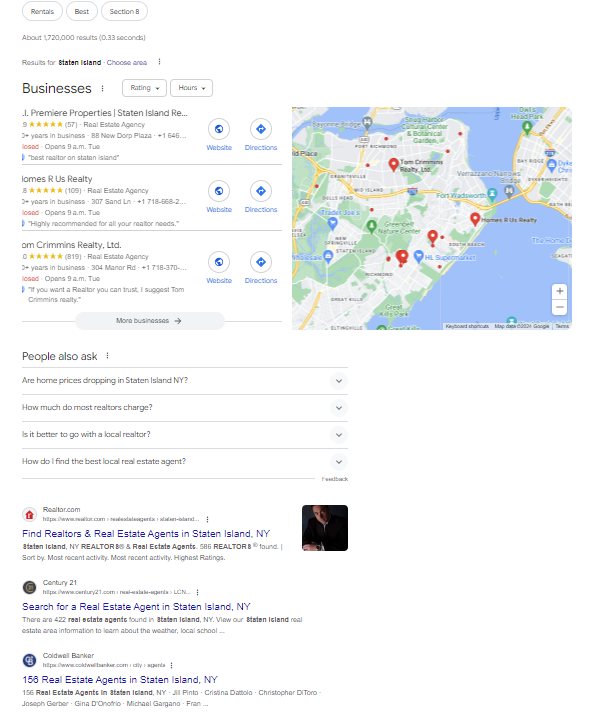
Optimize Your Google Business Profile
With your real estate SEO strategy in place, it’s time to focus on local SEO activities that promise swift and significant outcomes. Central to this effort is optimizing your client’s Google Business Profile (GBP) , a critical asset for boosting visibility online. The example below shows you what a real estate company’s GBP can look like.
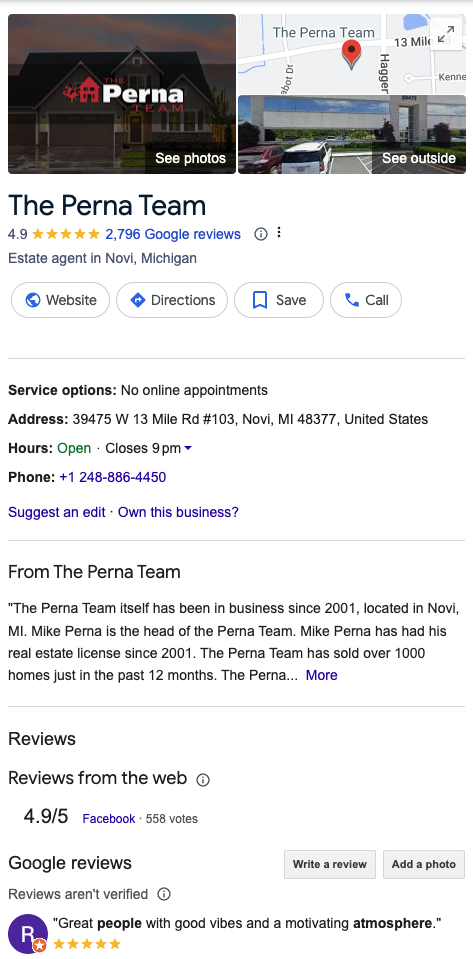
A well-maintained Google Business Profile is essential for real estate professionals, often serving as the first point of contact with potential real estate customers, sometimes even before they visit your client’s website. This profile not only improves your searchability but can also enhance your visibility early on, especially if your client’s website is still gaining traction in search rankings.
If you haven’t claimed or set up a Google Business Profile for your client’s real estate business yet, prioritize this step immediately. Opt for verification methods that are quick and reliable, such as via phone call or using a business video (I’d recommend avoiding postal verification due to its lengthy process).
Google Business Profile Tips
- Update the Business Information: Ensure every detail on the profile is comprehensive and accurate, including the business name, address, phone number, and website link. Consistency across the profile helps Google verify the legitimacy of the business, improving the overall search visibility. Incorporate relevant keywords into the business description to draw in potential clients, but keep the narrative clear and engaging for real people.
- Select Appropriate Categories: Choose Google Business Profile categories that accurately describe the real estate services you offer, such as “real estate agency” or “property listings,” to improve how potential clients find you during their specific searches.
- Incorporate High-quality Images: Visual appeal is crucial. Upload professional photographs of available properties, your client’s team, and successful transactions to make the profile stand out. These images not only attract attention but also reassure clients about the quality of your client’s services.
- Post Regularly: Utilize the GBP posts feature to share the latest updates, property listings, and industry news. Keeping the profile active with fresh posts and images demonstrates to potential clients that the business is dynamic and engaged with the market.
- Cultivate Reviews: Encouraging satisfied clients to leave positive reviews can significantly boost the profile’s effectiveness. Not only do these reviews provide valuable feedback, but they also improve search rankings, showcasing the business’s reputation and reliability.
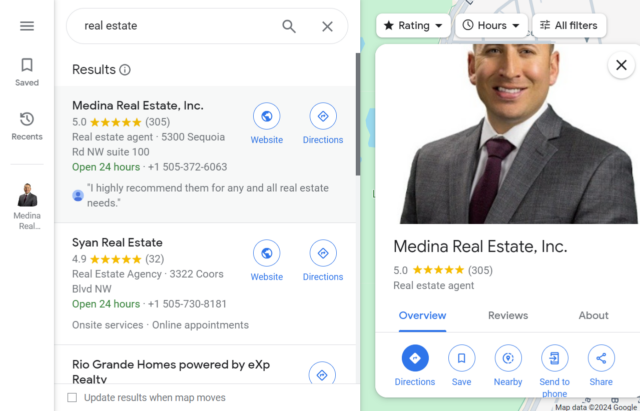
Something you may need to consider in real estate is practitioner listings. Real estate is an industry that Google allows to have individual practitioner listings. This means an individual can set up their own GBP. It’s generally advised for these practitioners to use their home address if they are comfortable doing so. Otherwise, they’ll likely just get filtered out at best, or at worst, they’ll compete with your main business’s listing.
This can be a tricky tactic to get the best out of, so make sure you look into managing practitioner listings properly.
Local Links for Real Estate Local SEO
Links have long been important for Google’s algorithms. When you’re trying to rank locally, it’s worth remembering that links from relevant local sites hold a lot more weight.
These links, from respected community sites, local news outlets, or industry associations, act as strong signals to search engines, affirming your business’s relevance and authority within a specific geographical area.
An effective tip for acquiring local links is to engage with your community by participating in local events, sponsoring local teams, or collaborating with local bloggers for guest posts.
These activities not only strengthen your community presence but also increase your chances of earning valuable local backlinks.
Actionable insights include regularly monitoring local media for opportunities to contribute expert opinions on real estate matters or offering insightful market analysis, which can lead to natural backlink opportunities.
Google’s Local Service Ads
Google’s Local Service ads are a pay-per-lead advertising platform that positions your client’s real estate services at the very top of search results, directly in front of potential clients.
By placing your services at the top of search results, these ads significantly increase your visibility and the likelihood of generating high-quality leads.
Unlike traditional pay-per-click advertising, you pay for leads, not clicks, making it a cost-effective solution for targeted marketing.
If You Have Multiple Locations…
If your real estate company operates in more than just one location, there are a few things you’ll need to consider.
My first piece of advice would be to set up a Google Business Profile for each location as an absolute minimum. However, while every circumstance is different, you don’t necessarily need to create a new website for each location, especially if the additional locations are in the surrounding cities.
In this situation, you could simply create local landing pages that detail your knowledge of the area and the listings you have available there, and potentially supply information on your physical location and the team there.
As you can see in the example below, Perna has created a location page for multiple cities and communities. Each of these has a short overview of the area, some key statistics, the live real estate listings, and then more in-depth area information that a buyer may find useful.
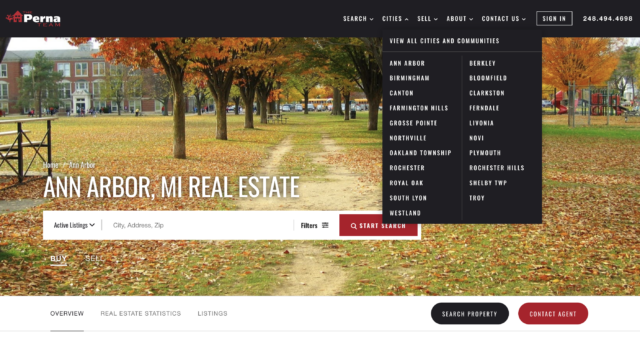
If your client has locations in different States or Provinces, creating an additional website for those would be helpful.
There are more on location pages later in this guide.
What You Need to Know About Local Citations
Local citations play a crucial role in enhancing the online presence of a real estate business, acting as a signal of credibility to search engines. Ensure each listing of the business across directories is consistent, with accurate NAP (Name, Address, Phone Number) information to boost local search rankings.
Regularly auditing and updating your citations can prevent discrepancies that might harm your SEO efforts. Encourage reviews on these citation sites to increase engagement and provide social proof of your client’s business’s reliability.
Building citations not only increases visibility but also reinforces authority in the real estate market, making it easier for potential clients to find and trust your client’s services.
Not every platform will be relevant to your client, so be discerning when necessary. The link below provides an extensive list of directories for real estate agents.
Generating and Managing Reviews
Encouraging clients to leave positive reviews is vital for bolstering your real estate client’s online reputation. Each glowing review is a testament to the quality and reliability of your client’s services.
Actively respond to all positive or negative reviews to show engagement and commitment to client satisfaction. This is a huge part of review management.
Develop a streamlined process for requesting reviews from clients post-transaction. Make sure you ask everyone, regardless of how smooth the buying process went. It will quickly become obvious to review platforms if you only ask people who have a good experience, and this kind of “review gating” is strictly against many review platform guidelines.
Leverage social media and email campaigns as platforms to remind clients about leaving feedback. Monitor review platforms regularly to address any concerns promptly.
The key to this process is consistency. Once you find a process for curating and managing reviews, stick to it.
Positive online reviews can dramatically improve your client’s SEO standings, making this a crucial part of your strategy.
Creating Compelling and Valuable Content
Creating content that resonates with both buyers and sellers requires a deep understanding of their needs, preferences, and the challenges they face in the real estate market. Focus on developing blog posts, infographics, and videos that offer practical advice, market insights, and property highlights to engage your client’s audience effectively.
But don’t worry if some of those formats are out of your reach. If all you can produce, for now, is a bunch of well-researched and authoritative blogs, that’s ok. Video, for instance, could come later. Creating content of real quantity will be much more beneficial than doing it at scale poorly.
Tailor your content strategy to address common questions from buyers and sellers, such as tips for first-time homebuyers or how to stage a home for sale, providing real value. Leverage local market data to create reports or analysis pieces that position you as the go-to expert in your client’s area.
Tip: Utilize Google’s PPA (People Also Ask) search results type for potential blog ideas about real questions that people are asking. This is a good step to take in your keyword research. 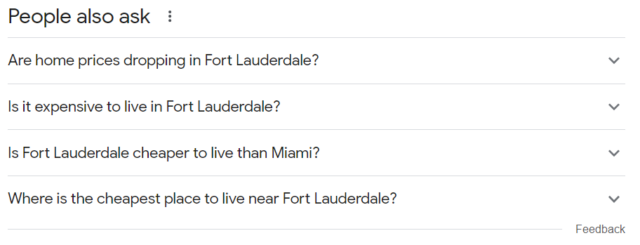
Craft your content with a human-centric approach, incorporating several hundred words with integrated targeted keywords, ensuring readability and relevance. High-quality content remains the pinnacle of what search engines value most in ranking websites.
Don’t Forget About E-E-A-T (Expertise, Experience, Authority, Trustworthiness)
For real estate professionals, showcasing a deep knowledge of the market, years of successful transactions, and authoritative insights on property trends is important.
Demonstrating expertise through detailed neighborhood guides, experience via success stories, authority through market analysis, and trustworthiness with transparent client testimonials can significantly enhance a website’s E-E-A-T.
This, in turn, not only aligns with Google’s guidelines for high-quality content but also builds confidence among potential buyers and sellers, making it a pivotal strategy in the competitive landscape of real estate SEO.
Learn from What’s Working
Analyzing the content strategies of successful competing real estate professionals can provide invaluable insights into what resonates with your target audience.
By observing which topics, formats, and SEO tactics are yielding results for them, you can identify gaps in your strategy and areas for enhancement. Learning from competitors’ successes allows you to refine your approach, adopting proven methods to improve engagement and visibility.
Ultimately, this analysis is a shortcut to discovering effective practices in real estate marketing, enabling you to adapt and innovate based on solid, real-world data.
Content Clusters and Pillar Pages
The strategy I employ is using content clusters and pillar pages.
A pillar page serves as the foundation, covering a broad topic related to real estate, such as “Home Buying Guide” or “Selling Your Property.” It provides a comprehensive overview of the subject, offering value to readers while leaving room for more in-depth exploration.
Content clusters, on the other hand, consist of specific, related articles or pages that delve into subtopics of the main theme outlined in the pillar page.
For example, within a “Home Buying Guide” pillar page, content clusters could include articles on “Financing Your Home Purchase,” “Understanding Home Inspections,” or “Navigating Closing Costs.”
These subtopics link back to the pillar page and vice versa, creating a tightly interlinked structure. This setup helps search engines understand the relationship between the pillar page and its clusters, boosting the authority of the site on the topic and improving its search rankings.
For a more thorough exploration of the method, please refer to this forum post/video about creating content clusters and pillar pages from Real Estate Webmasters’ CEO, Morgan Carey. The video might be just under an hour, but it’s worth every second of your time.
Refreshing Content
Refreshing content is an important tactic in SEO. It’s easy to fall into the trap of making new content for the sake of it. If you’ve already got plenty of content, though, it’s often worth taking some time to review it and see whether it’s as helpful as it can be.
This ensures your client’s website stays relevant to current market trends and search engine algorithms, ultimately attracting more potential buyers and sellers.
Plus, oftentimes, refreshing is a faster process than starting a blog from scratch.
Content Refresh Checklist
- Audit Existing Content: Begin by reviewing your site’s existing real estate content, identifying outdated pieces lacking engagement or no longer reflecting current market conditions. You can then decide whether it’s worth updating or even removing old pieces. Perhaps you made a guide four years ago that goes deep into what living in a specific area is like. Well, in that time, multiple businesses opened or closed, the school won some awards, and maybe the crime rate changed.
- Keyword Research: Perform updated keyword research to capture the latest trends in real estate searches, focusing on what potential clients are currently looking for in your client’s area.
- Competitor Analysis: Examine content from competing real estate websites to identify gaps in your content strategy and opportunities for improvement. Using the example of the area guide again, you can look at what your competitors have done and spot any areas you missed. Maybe they had a run-down of the best places to get coffee, you could add that into yours, too.
- Update Market Data: Ensure all statistics, listings, market trends, and property prices are up-to-date and reflect the current real estate market.
- Enhance User Experience: Make your content more engaging and user-friendly by considering layout and readability and incorporating new, high-quality images or virtual tours of properties.
- SEO Optimization: Update SEO elements like meta titles, descriptions, and headings with current keywords, and ensure your content structure is optimized for search engines.
- Refresh Internal Links: Add links to newer content or important pages on your client’s site to keep users engaged and distribute page authority throughout it. Also, check to see whether you’re linking to the piece you’re updating from other pages on your site.
- Promote Updated Content: Share your refreshed content through social media, email newsletters, and other channels to drive traffic and signal to search engines that your client’s site is active.
- Monitor Performance: Use analytics tools to track how the refreshed content performs, adjusting your strategy based on user engagement, traffic, and conversion rates.
Following this process not only improves your client’s website’s SEO performance but also ensures your real estate content remains a valuable resource for clients navigating the housing market.
Crafting Unique and Helpful Location Pages for Each Property
Creating distinct location pages for each area where you have listings is a strategic move to capture local search traffic. These pages should include specific details about the neighborhood, schools, and nearby amenities to boost SEO and user engagement.
You’re essentially painting a picture for potential homeowners about the area they want to move to. Don’t embellish, but highlight all of the reasons why someone should move to the page you’re writing about. You’re also showing Google that you really understand the area and the needs of prospective buyers there.
When I’m writing these pages, I typically focus on splitting my headings into:
- Describing the area in great detail.
- The specific types of homes typically for sale in the area and the demographics typically found in the local community.
- A collection of entertainment and amenities that the area offers. Just remember, the more local restaurants and shops you include in this list, although helpful, require more upkeep long-term to ensure you’re not linking to closed businesses.
- A list of common FAQs that potential homeowners would ask. However, please note that Google has downgraded the importance of FAQs and How-Tos, along with their respective schema recently.

Tailor each page’s meta titles and descriptions to include local search terms. This targeted approach makes your client’s listings more discoverable to those searching for properties in specific locations.
Don’t Sleep on Technical SEO
Focusing on these technical aspects will help your client’s real estate website rank higher, attract more local traffic, and convert more leads. Other than local business schema, these changes are more general SEO best practices rather than something specific to local.
A few tasks for you to consider are:
- Mobile Responsiveness: Ensure your client’s site looks great and functions seamlessly on mobile devices, as more searches are performed on mobile than on desktop.
- Page Speed Optimization: Speed is key. Use tools like Google’s PageSpeed Insights to identify and fix slow-loading elements to keep both users and search engines happy.
- Secure Sockets Layer (SSL) Certificate: Implement HTTPS to secure your client’s site. It’s important not only for user trust but also for Google’s ranking. Google likes safe sites.
- Clean URL Structure: Use readable, keyword-rich URLs. Keep them short and sweet, and avoid unnecessary parameters or numbers.
- Schema Markup for Local SEO: Implement local business schema to enhance visibility in local searches. This includes adding structured data for your client’s address, phone number, business hours, and more.
- Optimize Title Tags and Meta Descriptions: Include relevant keywords and make them compelling to boost click-through rates from search engine results pages.
- Image Optimization: Compress images to speed up load times and use descriptive file names and alt tags to improve accessibility and relevance.
- Internal Linking Structure: Create a logical internal linking strategy to help search engines and users navigate your client’s site. Use relevant anchor text for these links.
- Duplicate Content: Avoid duplicate content issues by using canonical tags when necessary and ensuring each page offers unique value.
- XML Sitemaps and Robots.txt: Submit an up-to-date XML sitemap to search engines to help them crawl and index your client’s site efficiently. Use robots.txt to control what parts of your client’s site search engines can access.
- 404 Error Management: Monitor and fix any broken links or pages to improve user experience and maintain site authority.
11 SEO “Tactics” to Avoid
Some of what you will read below used to be common practice but not in today’s marketplace. Be mindful to avoid these additional malpractices, which can harm your client’s website’s ranking and credibility.
- Cloaking: Showing different content to search engines than to users, a deceptive practice that can lead to severe penalties.
- Using Doorway Pages: Creating low-quality pages designed solely to rank well in search results and funnel users to a different page. In real estate, these may well be your location pages. Make sure those add real value and aren’t just full of overly optimized headers with no real information.
- Sneaky Redirects: This deceptive practice redirects visitors to a different URL than the one they initially clicked on.
- Hidden Text: Including text on a page that’s the same color as the background, positioned off-screen, behind an image, or deliberately concealed in any manner to incorporate more keywords should be avoided.
- Article Spinning: Rewriting existing content with slight variations to create “new” content, often resulting in low-quality or nonsensical text.
- Overusing Anchor Text: Aggressively using exact-match anchor text for internal or inbound links can appear manipulative to search engines.
- Scraping Content: Copying content from other websites without adding value can result in duplicate content issues and may lead to legal challenges.
- Keyword Stuffing: This involves overusing your target keyword or keywords to the point of redundancy.
- Link Buying: Rather than naturally earning backlinks, this tactic involves purchasing them, which is frowned upon.
- Automatically Generated Content: Using software to generate content without human review often leads to poor quality and irrelevant, sometimes inaccurate content.
- Excessive Reciprocal Links: Exchanging links with other sites purely for the sake of cross-linking, without genuine relevance or value to users.
Focusing on creating high-quality, relevant content and following ethical SEO practices is the best strategy for long-term success in search engine rankings.
Let’s Wrap This Up
Fundamentally, real estate SEO doesn’t follow a one-size-fits-all approach. It involves experimenting with various tactics to discover what elevates your listings and enhances your online presence. Every real estate business is unique, with diverse goals and benchmarks for measuring SEO success.
Communication is key—aim to set realistic expectations and then strive to exceed them. Real estate professionals may not be SEO experts, and it’s your role to demonstrate the tangible benefits of your SEO strategies. Through clear examples and results, you can illuminate the value SEO brings to their business.

